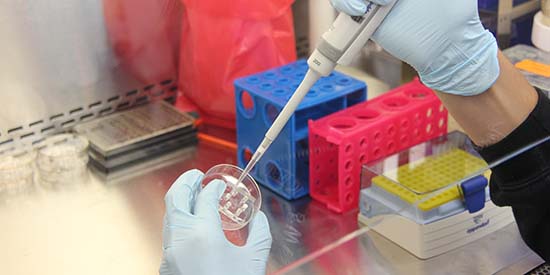Progress in evolutionary ecology threatened by variable data
Media releaseA world-first study from Deakin University has found that ecology labs are recording up to 10-fold differences in hormone levels across the same sample, raising questions about some currently published research conclusions.
The research paper, 'Inter-laboratory variation in corticosterone measurement: Implications for comparative ecological and evolutionary studies' was published today in the journal Methods in Ecology and Evolution.
Lead researcher Professor Kate Buchanan said measurements of animal hormone levels - chemical messengers known to control all kinds of behaviour from mating, aggression and parental care - were often compared across labs to gain important insights into broad evolutionary and ecological patterns.
"What makes poultry grow fat, how do birds time their nesting behaviour, or why do some birds lay large numbers of eggs? These questions are all answered by analysing hormone levels," she said.
But Professor Buchanan, an Australia Research Council Future Fellow, said research conclusions drawn from data across multiple labs were only going to be reasonable if measurements were comparable.
"In this study we focused on corticosterone, a hormone that plays an important role in the stress response," she said.
"We asked 19 labs from around the world to measure corticosterone in a standard set of samples that had concentrations of this hormone resembling those found in wild birds. These varied from an undisturbed bird, through to the levels expected in an individual that has been, for example, chased by a predator.
"While individual labs measured the samples in the same rank order, we found that there was up to a 10-fold difference in the absolute measurements reported from different labs.
"This means that a sample that was determined to be 'baseline' by one lab could be determined to be 'stressed' in another lab."
Senior author on the paper Dr Kerry Fanson, a lecturer in zoology in Deakin's School of Life and Environmental Sciences, said this was problematic for making comparisons across labs and could lead to misleading conclusions in scientific literature.
"Anyone who has had a blood sample tested at the doctor will appreciate that measurements need to be comparable among labs in order to ensure an accurate diagnosis," Dr Fanson said.
"Medical labs invest a lot of effort standardising measurements across labs, but that is not the case in ecology, where individual labs, interested in how and why animals behave the way they do, tend to run samples in slightly different ways."
Professor Buchanan said testing a hormone like corticosterone was particularly important for evolutionary ecologists, as it related to an animal's response to distressing conditions.
"It can tell us a lot about an animal’s physiological response to change, particularly when conditions deteriorate," she said.
"Ultimately, it helps us understand how well threatened species are dealing with things like reduced food availability, fragmented habitats and climate change.
"And in the commercial-sphere it can help us determine if free range hens are actually happier than those in barns or cages, for example."
Professor Buchanan said greater awareness was needed about the problems of comparing data between labs.
"A move towards more strictly standardised data would require significant international funding and cooperation for quality control, such as has already been established within biomedicine.
"That means the most important thing we can do to address the issue now is ensure scientists are carefully taking into consideration labs as a differential factor in their research and tempering their conclusions accordingly.
"This greater awareness of variation among labs will allow us to develop more robust conclusions about evolutionary patterns across animal groups."

